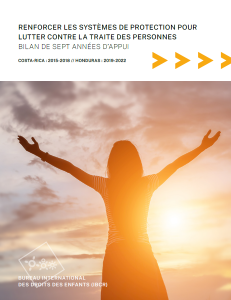
The International Bureau for Children’s Rights (IBCR) unveils a new publication analyzing and taking stock of seven years of intervention in Central America to strengthen the fight against human trafficking in Costa Rica (2015-2018) and Honduras (2019-2022).
Despite their efforts to combat human trafficking, Honduras and Costa Rica have been facing an upsurge in this crime for several years, affecting a growing share of their populations, especially among vulnerable communities. The IBCR is therefore engaged in both countries to support efforts and strengthen the fight against human trafficking and the protection of vulnerable populations.
While the project in Costa Rica focused on strengthening state actors involved in the fight against trafficking in persons, particularly child trafficking for commercial sexual exploitation, the actions in Honduras went further by also empowering vulnerable communities.
After seven years of support in the region in close collaboration with local partners, the actions taken have generated several major changes, including:
A more adapted accompaniment of the victims and respect for their rights
Professions and communities that know how to better identify, report, prevent and accompany cases of human trafficking
Sustainable changes in practices and perceptions
Better coordination of control actions at the national and regional levels
A publication to take stock
These changes, as well as the challenges identified to effectively combat trafficking in persons and the approaches implemented to address them, are brought together in a groundbreaking report that provides a comprehensive view of the actions undertaken by the Office and its partners in Costa Rica and Honduras. The publication also discusses the lessons learned from the Office’s experience, and the road ahead to ensure that people in these two countries live a life free from the risk of trafficking.
At a glance :
In Honduras
76% of those involved in the project say that the actions taken have reduced the vulnerability of marginalized populations, especially women and girls, to human trafficking.
86% of those involved say that the project has had a positive impact on the lives of trafficked persons.
96% of those involved in the project say that the positive effects are likely to continue.
96% of civil society actors said that their participation in the project helped improve their child protection practices.
The figures cited for Honduras are based on the final evaluation of the project, conducted with 109 people (58 from state institutions and 51 from civil society) between July and August 2022.
In Costa Rica
96% of police and justice personnel believe that their participation in the project has improved their implementation of legislation, policies and practices related to trafficking in persons.
100% of those who participated in the project believe that the tools developed or strengthened will, over time, reduce the vulnerability of victims in the country and make coordination between institutions more effective for better case management in general.
100% of police and judicial personnel trained in Costa Rica now consider themselves adequately equipped to play their role in the fight against human trafficking.
The figures cited for Costa Rica are based on several assessments conducted during the project with those who participated.







